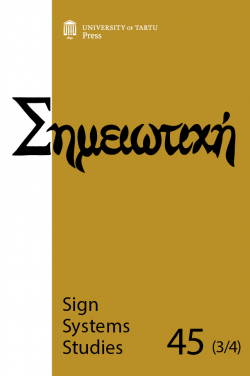Semiosphere and history: Toward the origins of the semiotic approach to history
DOI:
https://doi.org/10.12697/SSS.2017.45.3-4.08Keywords:
Juri Lotman, Boris Uspenskij, Tartu-Moscow School of Semiotics, semiotics of history, history of scienceAbstract
This article compares the approaches to the semiotics of history of two central figures of the Tartu-Moscow School of Semiotics – Juri Lotman and Boris Uspenskij. It is argued that Lotman’s approach to the semiotics of history is closely connected with the development of his theory of the semiosphere (despite Lotman’s unfailing interest in history, his theoretical interpretation of the historical process was, in fact, secondary to his reflection on the semiosphere), that is, with the shift in his research from studies of literary-historical cases to typology. Meanwhile, Uspenskij, a linguist who started out as a scholar of structural language typology, moved in the opposite direction, becoming increasingly engaged in the examination of individual historical cases. Lotman’s correspondence with Uspenskij serves as proof that semi-formal communication on scientific issues between the representatives of the Tartu-Moscow School was often what inspired new fundamental ideas and further development of theoretical concepts.Downloads
Download data is not yet available.
Downloads
Published
2017-12-31
How to Cite
Trunin, M. (2017). Semiosphere and history: Toward the origins of the semiotic approach to history. Sign Systems Studies, 45(3/4), 335–360. https://doi.org/10.12697/SSS.2017.45.3-4.08
Issue
Section
Articles


